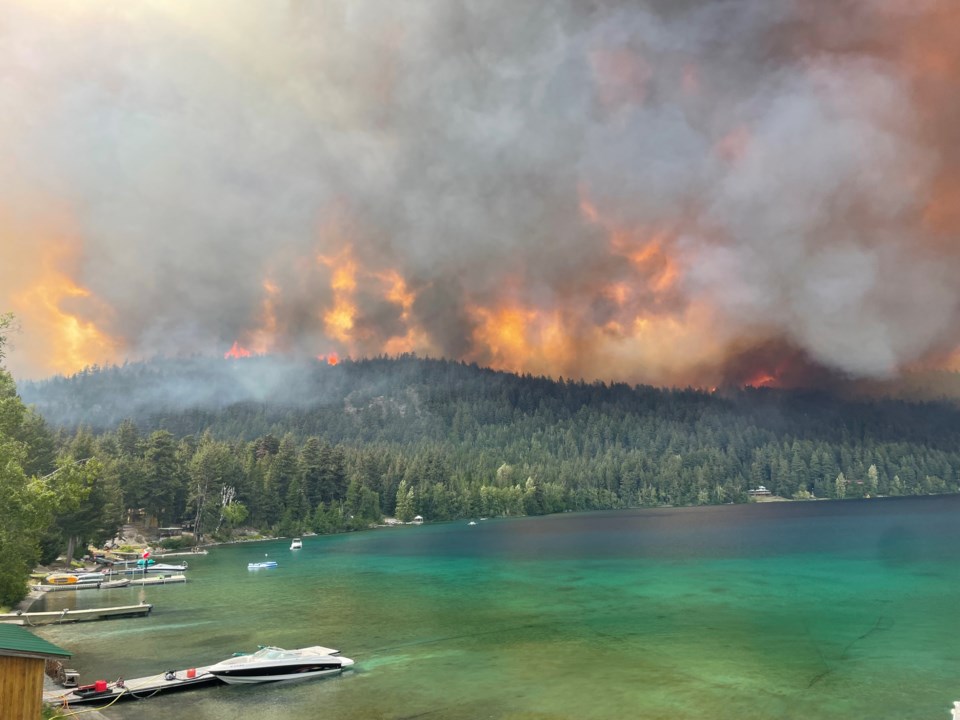The Squamish-Lillooet Regional District (SLRD) board heard a brief update on emergency readiness on May 22, with the SLRD’s emergency program manager telling the board the area is currently a mixed bag for risks.
“All electoral areas in the SLRD are currently much drier than average, and the watersheds of Areas C and D are both much drier than last year,” said Michael Fusca at the May 22 board meeting.
As seen in the report, the snowpack for the Sea to Sky corridor is in line with the provincial average of 66 per cent below normal. The South Coast (which includes Squamish) is at 61 per cent, while the Lower Fraser (Whistler and Pemberton) is at 67 per cent, and the areas around Lillooet and the Bridge River Valley are right on the provincial average.
“This has caused reduced risk of freshet flooding this spring, but will contribute to the ongoing drought conditions, which increases the potential for severe wildfires.”
Fusca added the risk of wildfire is heavily dependent on weather conditions that can't be forecast more than a few days in advance, however.
“If we get a lot of precipitation this spring and summer, we may see very little community impact from wildfires. But its also important to recognize that if we get a lot of hot, dry weather, the ongoing drought conditions could make any fires that do occur a lot worse,” he said.
Overall, Fusca said the current approach for the SLRD and its Emergency Operations Centre (EOC) is to plan for the worst and hope for the best, noting the district is still involved in disaster recovery related to fires in 2023.
To that end, Fusca reported lessons learned from summer 2023 were helping with this year, while the EOC and SLRD have worked with the BC Wildfire Service's Cooperative Community Wildfire Response Program to establish training standards, oversight protocol and a framework for incorporating community volunteer and equipment resources into firefighting operations.
Fusca also listed joint exercises to work on emergency response processes, workshopping with the Ministry of Agriculture, and a well-underway FireSmart program in the area which according to the report has seen more registrations in 2024 so far than all of 2023.
Finally, the report noted that, while efforts are being made towards disaster resilience, staff are limited by capacity and previous incidents that still require attention.
“In addition to preparing for future disasters, the Protective Services Department continues to be heavily involved with recovery tasks related to the November 2021 and January 2024 atmospheric rivers, and the 2023 wildfire season,” reads the report.
“Current efforts are focused only on the highest-priority preparedness tasks, meant to close only the most urgent gaps prior to the start of the 2024 wildfire season.”
During discussion, Area D director Tony Rainbow queried a fire ban, and was told while the SLRD did not have a bylaw in place to implement a seasonal fireban, areas outside of municipalities with their own bans in place, and within Crown Land, are governed by provincial fire bans.
“I’ve had questions and comments that we really should have a campfire ban throughout the Sea to Sky,” he said. “How can we do that?”
While there was some discussion around a potential bylaw to be implemented, no motion was made and the board voted to receive the report.
Area C director Russell Mack noted given the conditions of the spring season so far, there was little need to implement a fire ban in the SLRD.
“So I don’t think we need to overreact," he said. "BC Wildfire Service will certainly be telling us when it's time … and then they will enforce it through their fire wardens.”
Currently, various municipalities within the SLRD have their own fire bans in place, while the wider area is governed by the Coastal Fire Centre, which currently has a ban on Category 2 and 3 fires, but allows Category 1, which includes small campfires.




